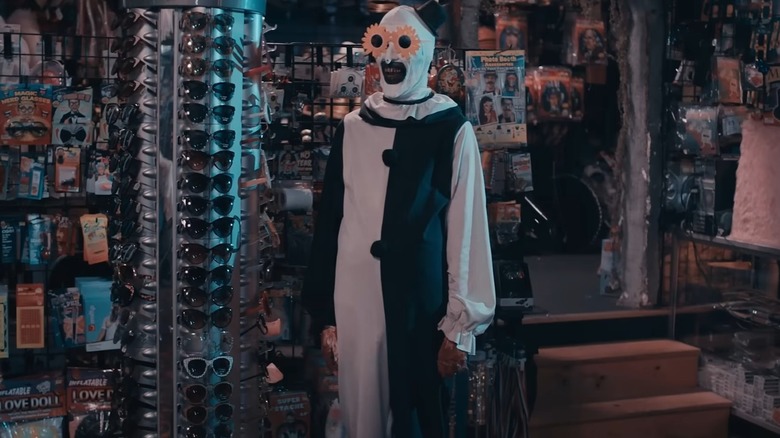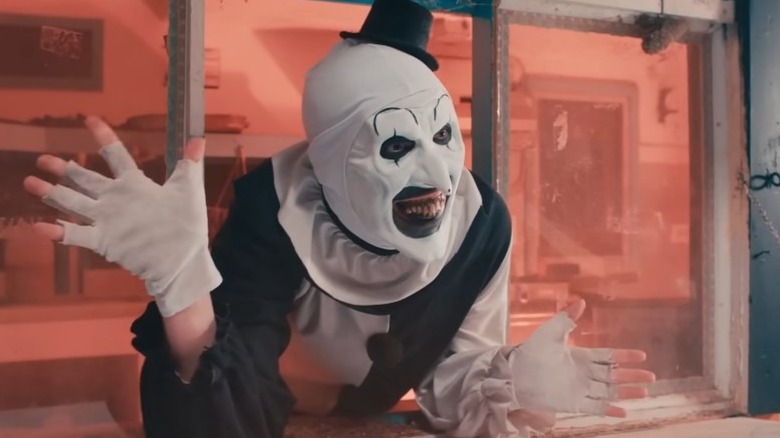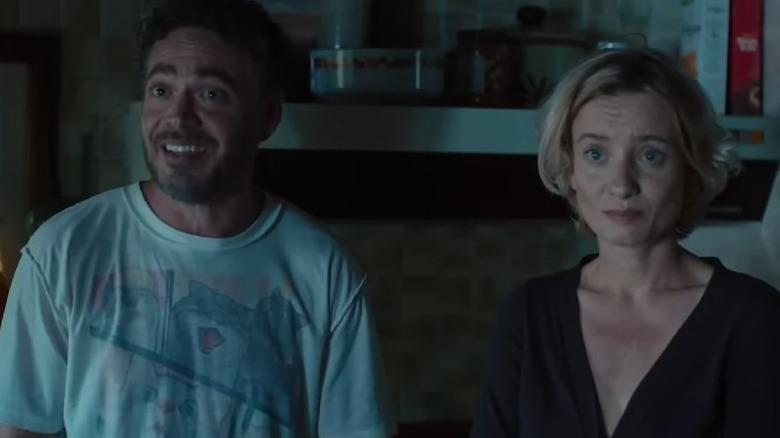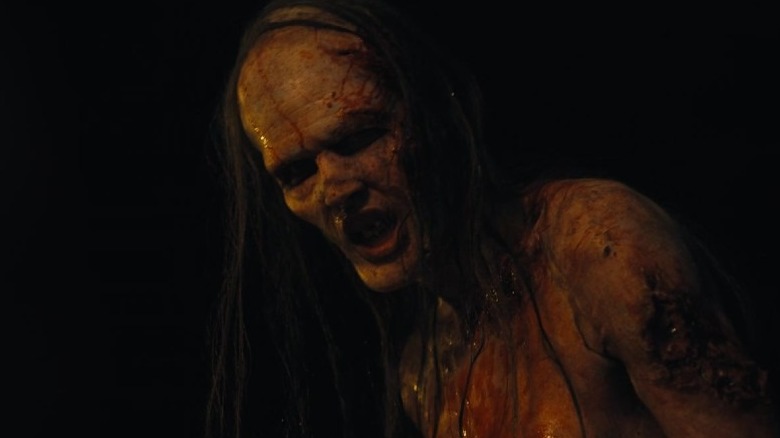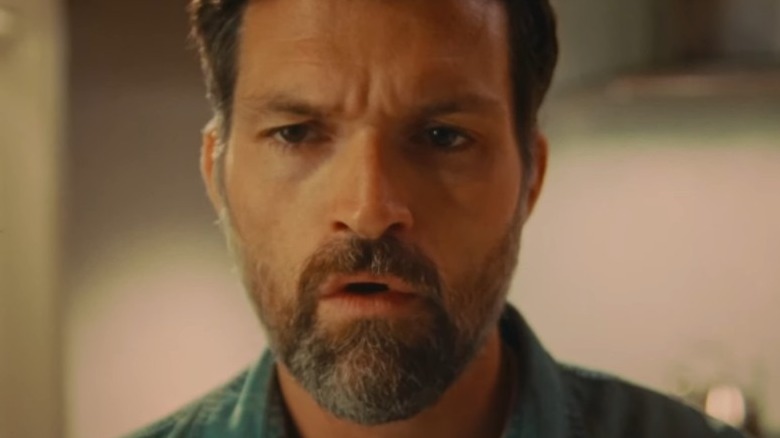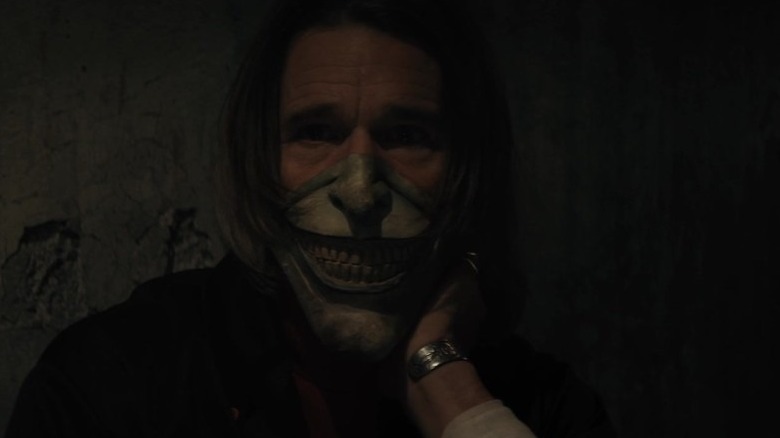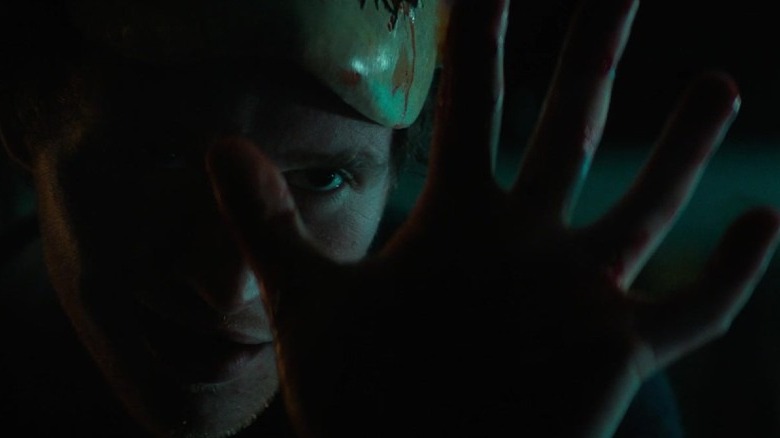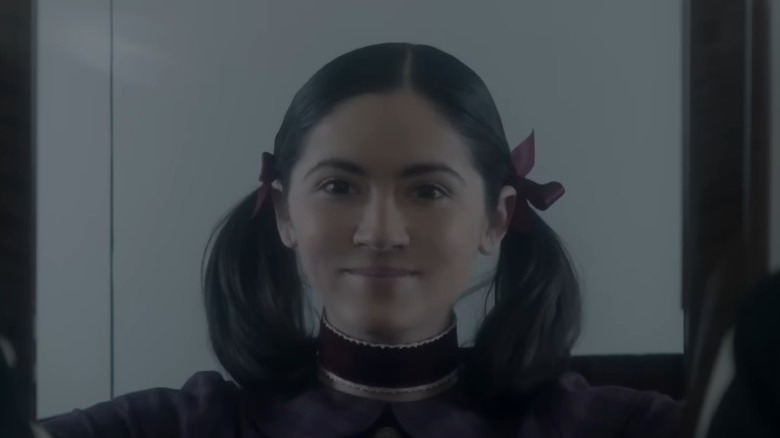Horror Villains That Saved Their Movies In 2022
Warning: This post contains spoilers for the horror movies on this list.
2022 was nothing short of a banner year for horror. Way more films were met with critical praise and box office success, from Jordan Peele's third studio feature "Nope" to "Smile" and "Terrifier 2." Yes, there were several protagonists to root for, but a horror movie would be nothing without a deliciously disturbing villain. In 2022, villains ranged from the supernatural (Pinhead from "Hellraiser") to the definitely human (Steve from "Fresh") and everything in between. There was no shortage of evildoers that wreaked absolute havoc and left a trail of bodies in their wake.
Below, we take a look at some of the year's less-than-stellar releases where villains stole the show. To qualify for this list, the films themselves either lean into polarizing territory or had debatable in their quality. But these villains were the glue that held their respective films together. Whether they're a serial killer abducting children, a silent clown, or an unhinged husband and wife, our picks celebrate the villains that captivated audiences — despite everything surrounding them. Strap in, it's a controversial ride!
Art the Clown (Terrifier 2)
"Terrifier 2" is a nauseating watch. From start to finish, its brutal depictions of violence are not for the faint of heart. In the aftermath of the previous film, Art the Clown (David Howard Thornton) resurrects and goes on another bloody rampage, tearing through Miles County all over again. His proclivity for inflicting pain leads him to totally disregard human life. Many of his kill scenes are excruciatingly long 一 Allie's (Casey Hartnett) live skinning instantly comes to mind. To say the film could make you puke is an understatement.
In the sequel film, Art emerges around Halloween time and has a different target in mind. A young girl named Sienna (Lauren LaVera) and her brother Jonathan (Elliott Fullam) fall into his path and must fight to survive. Often, the film feels as though the filmmakers wanted to string together kills for gratuitous violence, making the storyline an afterthought.
Still, Art steals the show. Yes, the "artful" (pun intended) ways he kills people might be hard to stomach. But that doesn't make the death scenes any less iconic. Thornton deserves all the credit for bringing the clown maniac to life: His mannerisms are enough to send goosebumps down your spine. While the quality of the film is debatable, Art the Clown's talent is not. With the film raking in more than $10 million at the domestic box office, Art has staked his claim on the horror genre.
Patrick & Karin (Speak No Evil)
"Speak No Evil" might make you faint from exhaustion — and not in a good way. The story follows Bjørn (Morten Burian) and Louise (Sidsel Siem Koch) on their vacation in Tuscany. They meet another young couple, Patrick (Fedja van Huêt) and Karin (Karina Smulders). Striking up an immediate friendship, Patrick invites Bjørn and Louise to their home in the Dutch countryside.
What transpires next is an infuriating cautionary tale about saying no to your children and keeping up boundaries with strangers. Bjørn and Louise don't know what hits them on their trip, as they fall further into Patrick and Karin's deranged grasp. It's the insidious way they plot against Bjørn and Louise that is most terrifying, first gaslighting them and later beating them to a pulp. But it's the build that makes it work. Things begin fairly innocuous and escalate in increments: Bjørn and Louise don't even realize what's happening to them. Eventually, it dawns on them that it's time to pack up their car and escape. However, their daughter forgot her toy rabbit, so they head back to the countryside. (What a wrong move that was!)
Bjørn and Louise fight back as best they can, but it's futile. After stripping Bjørn and Louise naked and throwing stones at them, they share why they did all this, and it's wonderfully chilling: "...because you let us."
The Mother (Barbarian)
"Barbarian" likely had you yelling at the screen. When Tess (Georgina Campbell) visits Detroit for a job interview, she books an Airbnb. But when she arrives, it's already taken. A man named Keith (Bill Skarsgård) has settled in for the night. A thunderstorm rages overhead, and Tess reluctantly decides to spend the night. Tess is safe enough until The Mother (Matthew Patrick Davis), a disfigured and monstrous human being, creeps from her underground nest and drags Keith into the tunnels.
Instead of saving herself, which a genre-savvy protagonist would have done, Tess makes head-scratching decisions. She just met Keith, whose strange flirtations are off-putting. However, she's more than willing to save him. Up until the end — like when actor and property owner AJ (Justin Long) tosses Tess from a tower — Tess assumes the best of people, and it nearly kills her.
Where the film lacks strong, relatable characters, The Mother makes up for it with her brute strength and complex social underpinnings. A result of rape and incest at the hands of serial rapist Frank (Richard Brake), The Mother knows no other world than the belly of the earth. Ultimately, it's her humanity that further contextualizes the character and makes for fascinating viewing. Credit should go to the special makeup effects team, especially since the character was greatly inspired by the medieval poem "Beowulf." Without her, the film would simply not work.
If you or anyone you know has been a victim of sexual assault, help is available. Visit the Rape, Abuse & Incest National Network website or contact RAINN's National Helpline at 1-800-656-HOPE (4673).
Bruce (A Wounded Fawn)
You could say "A Wounded Fawn" is the dreaded "elevated horror." That would not be an unfounded claim. With its stretches through Greek mythology — namely The Wrath of Eriny, three furies hellbent on vengeance against men — the film follows an art buyer, Bruce (Josh Ruben) who moonlights as a serial killer. After stealing a prized piece of art, a depiction of The Wrath of Eriny, he invites a young woman named Meredith (Sarah Lind) to his secluded home for a weekend getaway. Things start off innocent, but as mysterious beings start to circle the residence, it gets weird. Hyper-stylized dream-like sequences litter the film, effectively bringing the viewer into Bruce's distorted reality.
It won't work for everyone, especially as the film descends further into surreal imagery. But it's Bruce that holds the film together. Ruben gives the role a particular complexity. Bruce is torn between his humanity and a hunger to kill. No matter how hard he resists, he can't help but succumb to his urges. Bruce is dashing and kind, so it's no surprise to see Meredith fall for his charms. These traits make him the perfect murderer, as he excels at disarming people.
Ruben's performance is exceptional. He fully lives within the world director Travis Stevens has created. While it might not work on all cylinders, you can count on Ruben to deliver the goods. Plus, for that extended end credits sequence 一 Ruben deserves an award!
The Grabber (The Black Phone)
In "The Black Phone," Ethan Hawke terrifies us as The Grabber. Despite rarely showing his face, he's a menacing presence. The Grabber likes to wear creepy masks and snatch young children off the street by pretending to be a magician with black balloons. He pounces at just the right moment before the kids have a chance to realize what's happening. The story focuses on a boy named Finn (Mason Thames) and his younger sister Gwen (Madeleine McGraw) who come into The Grabber's orbit.
After Finn goes missing, Gwen attempts to use her psychic abilities to track her brother. The cops enlist her help, as each of her tips draws them closer to the culprit. Meanwhile, Finn is held hostage in a concrete basement containing a single bed and a black phone. The Grabber claims that the phone doesn't work but Finn can hear it ringing. On the other end, previously kidnapped kids reach out from the other side to help Finn escape. Ultimately, these supernatural elements distract what would have been a gripping tale about abduction.
Thankfully, The Grabber is a compelling villain. He taps into those universal fears of walking home alone at night and not knowing who (or what) might be behind you. Hawke commands each and every scene, and it feels as though he's speaking to you right through the screen. He's that good.
Corey (Halloween Ends)
Where is Michael Myers? That's the question on most fans' minds when watching the concluding chapter of David Gordon Green's reboot trilogy. "Halloween Ends" shifts away from expectation to craft a quieter exploration of Corey Cunningham (Rohan Campbell), a young man driven mad by a town he should have been able to trust. When a kid he's babysitting accidentally dies on his watch, Corey becomes accused of being a murderer. Years later, with Michael's help, he will become one.
Michael (James Jude Courtney), who now lives beneath Haddonfield in a sewer, largely stays in the shadows. He's rarely seen on-screen in any form of power, as he must kill to regain his murder-machine powers. He's shown in a more weakened state than we're used to seeing him — leaving Corey to carry the film, which he certainly does. When he finds himself down in one of the tunnels, a piece of the Boogeyman transports into his body, allowing him to exhibit unnatural strength and a thirst for blood.
Corey is what happens when you allow society to place its failings on one person. He's as much a victim as he is a disturbed killer. Taking a page from Michael Myers, Corey slashes his way through the Haddonfield streets, bumping those off who have erroneously crossed his path. Overall, it's a fascinating glimpse into the human psyche and how society makes its own monsters.
Esther (Orphan: First Kill)
It took more than a decade to get a sequel to "Orphan," and it was worth the wait for Esther (Isabelle Fuhrman) alone. "Orphan: First Kill" follows Esther's younger days in a psychiatric facility, her escape, and how she came to adopt the identity of another missing girl. Diagnosed with hypopituitarism, which gives her an appearance of a 9-year-old, she wields her disorder to her benefit. She lures unsuspecting families to take her into their homes and then kills them.
"Orphan: First Kill" is similar to the first film. Her "family" finds her, but this time her "parents" are Allen (Rossif Sutherland) and Tricia Albright (Julia Stiles). By exploiting their grief, Esther hides her identity. Throughout the film, ho-hum killing becomes mixed with familial drama. After the big twist reveal — Tricia knows her daughter died from an accident with her son, Gunnar (Matthew Finlan) — Tricia plots with Esther to keep her true identity a secret.
The strength of "Orphan: First Kill" lies solely in Fuhrman's performance. She plays innocence and evil with a scalpel's edge. Her emotions turn on a dime. Even though we know Esther's true self, she is thrilling to watch regardless of the film's quality.
